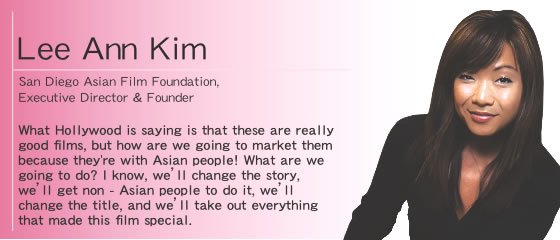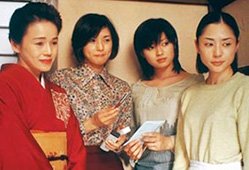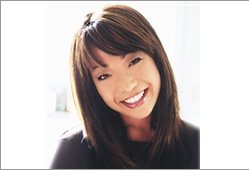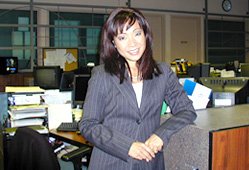YuYu interview Lee A Kim
 |
| —— Lee Ann you wear so many hats, Executive Director of the San Diego Asian Film Foundation, news anchor for KGTV, former president of San Diego’s Asian American Journalist’s Association, how do they all fit into your life’s work? My entire mission in life is to connect people and to give people a voice. Expression is such an important part of our lives and expression in many Asian cultures, at least verbally, is suppressed and has been for many years. There is something that is just so powerful in me, and I've recognized it since I was a child, about the power of expression and what that does to a person, and what it does to other people and the sharing of ideas and communicating. Whether that be through the news business, through a provocative film or whether it be through discourse and dialogue as result of watching a news piece or film. It's something that makes me so happy. When we have a great film festival or a great showing, even if it's a film that I donユt personally care that much about, but other people learn something from it that tells me all those hours and hours and sleepless nights were worth it! You know because every single person that comes to the SDAFF with an open mind, leaves with something more than what they came with! That's also something that I try to do with my news reporting and in my daily life. People see that I do a lot of work in the community and think I'm so great or whatever, but it's very selfish. I do it for me, because that's what really makes me happy. I know no other existence. —— Speaking of the SDAFF and your film festival, what makes it so special? You know life is so interesting in that good people and good spirits come to you in so many different forms. Through a real energetic workout or it could be through a friendship my dog Pepe Le Pew or a film. This Asian film festival was started in 1999, the planning at least, and honestly it is the only place where the Asian American community can go in one weekend and you can experience the cross-cultures of Chinese, Korean, Japanese, Vietnamese Asian American. It's the one place where you can feel totally Asian American. You get that sense. The problem is when we show films and it's a Japanese or Chinese film the majority of the audience is still going to be Japanese or Chinese and right on down the line. My hope, and it's starting to happen, is that one day I walk into a Korean film and there are Caucasian, black, Hispanic and the Asian American groups embracing it and celebrating it. We've got to get past the muckity-muck of the way Asians think of film and about other races. Why should I care about his film if it's Asian American and I'm Korean?ハ Well, duh! Because you're part of the whole system! —— So I understand you were the driving force behind the creation of the SDAFF. Yes, it's my fault! 
Morita Yoshimitsuユs “Like Asura” (Ashura no Gotoku) (above) and Inudo Isshinʼs “Josee, The Tiger and The Fish” (Josee to Tora to Sakanatachi)
Well, um okay in a nutshell, when I was in high school I did a lot of theater. A lot of theater and I was on the speech team. Speech team is different from what a lot of people think it is I competed every weekend in original comedy, humorous interpretation, humorous acting, drama and I excelled in it. I won first place in the state of Illinois, so I knew that I had this talent to communicate and to perform. When I went to college, my parents thought I was a business major, but I was really a theater majorムI never took any business classes! As it happened, I was the only Asian person in the theater department and there were no real roles for Asian people, so I was always cast as someone in the background or whatever. Finally, one day they cast me in as Joanna Lu a Chinese news reporter from San Francisco. Of course I was going to get that role because I was the only Asian around. And people couldn't stop telling me how much I looked and sounded like Connie Chung, and you and I both know that I don't look or sound like Connie Chung, but that I fit that role. That's when I decided that there was no future for me in theater until there were more roles for Asian women so why don't I go into journalism where I fit the role and I can put to use my talent to communicate. That's how I got into journalism. —— So what led you back from a career in journalism to founding the SDAFF? Well fast-forward six-years to 1999. I had come to San Diego in 1996 and in 1999 I decided to revive the local chapter of the AAJA, which had been dormant since 1995. I saw that there were so many Asians working in the news business here and so I thought it was ridiculous not to have a chapter here. So in the year that I revived it I asked myself, "What can we do to engage the larger community in Asian American issues?" I didn't want to just involve the media. Then it came to me FILM! Film crosses all borders, it's a universal language, everybody is interested in it, film is an event, and people will go out and see films. So I came up with the idea of a 3-day film festival as a fundraiser. Then, as I did my research I come to find out that there are Asian film festivals in LA, SF, NY, and Chicago all over and they're actually showcasing Asian American film. So we put up a website and a call for entry for our festival and that first year 60 filmmakers from around the U.S. sent in their films. Most of them weren't great, but I didn't even know there were 60 films like this out there! Until then, I felt as if I had been living in four colors, but after that year my life became so much more colorful. Wow! I think I found my calling and my joy in life. I was amazed at the plethora of stories that were sitting around on peopleユs shelves because there were no other outlets for them. They're fresh and unique, engaging, provocative, and the fact that they were being made by Asian Americans who went against the grain, went against their parents, are making no money, who took out credit card debt, who suffered and are living on five bucks a night for dinner to make these films is amazing. All because somewhere in their heart they figured that this is what they were born to do. I think that is what touched me and in them I found my heroes. I thought, "Aha!ハ So now my life has come full circle." from my roots in theater and performance, to journalism and connecting the community and now connecting the artists with the community. And so that's the genesis of it. —— And so how would you describe SDAFF’s mission? Our mission at SDAFF and the film festival is simply to support and promote the diverse Pan-Asian experience through the media arts. —— Does that include creating opportunity to have stories told?  Yes, that's definitely part of the supporting and promoting. I don't wish that I could say, "There is no need for the SDAFF." because I think what we have is very special, but the fact of the matter is the Asian film festival is in existence because "Hollywood" does not recognize Asians as part of the mainstream landscape. They still see us as foreigners ...they also see us as white, as far as our spending patterns. The reason why there are so many more African Americans and Latinos on television, and in commercials, and in movies, and in rap videos, and so forth is that these communities spend money supporting those movies and artists. Asian people, when films come out, don't recognize that their money is their vote is their power. Black people, on the whole, have less money than we do, but they recognize that their money is power and they use it. Same with Latinos. Asian Americans have more disposable income than any other group, but weユre damn cheap, right? So until Asian Americans go out in force and do the same, we will continue to be overlooked. Like when "Har8q0j_ and Kumar" came out it was like number 10 at the box office! I know a lot of Asian Americans were saying to themselves, "I'll just wait till it comes out at Blockbuster for a buck sixty-nine." It's true!ハ Hollywood only sees green, not white, black or yellow. Yes, that's definitely part of the supporting and promoting. I don't wish that I could say, "There is no need for the SDAFF." because I think what we have is very special, but the fact of the matter is the Asian film festival is in existence because "Hollywood" does not recognize Asians as part of the mainstream landscape. They still see us as foreigners ...they also see us as white, as far as our spending patterns. The reason why there are so many more African Americans and Latinos on television, and in commercials, and in movies, and in rap videos, and so forth is that these communities spend money supporting those movies and artists. Asian people, when films come out, don't recognize that their money is their vote is their power. Black people, on the whole, have less money than we do, but they recognize that their money is power and they use it. Same with Latinos. Asian Americans have more disposable income than any other group, but weユre damn cheap, right? So until Asian Americans go out in force and do the same, we will continue to be overlooked. Like when "Har8q0j_ and Kumar" came out it was like number 10 at the box office! I know a lot of Asian Americans were saying to themselves, "I'll just wait till it comes out at Blockbuster for a buck sixty-nine." It's true!ハ Hollywood only sees green, not white, black or yellow.—— So what do you think of the recent trend for Hollywood to remake popular Asian films like “Shall We Dance”? That's Hollywood's modus operandi I think it's horrifying. Asian films are hot right now and so American distributors are going over and purchasing the rights to films like "Shall We Dance" or "My Sassy Girl". What Hollywood is saying is that these are really good films, but how are we going to market them because they're with Asian people! What are we going to do? I know, we'll change the story, we'll get non-Asian people to do it, we'll change the title, and we'll take out everything that made this film special. I'm horrified that J.Lo and Richard Gere are coming out with their version. This is what I'm talking about. It's the way that they think at the top and we've got to change it and the way to change it is to go out in force and spend our money on films that relate to us. 
Lee Ann doing her best “Go Go Yubari” impersonation (Kill Bill) while promoting the SDAFF at this yearʼs Comic-Con.
We just finished. Let me think, we went from 60 to around 150 the following year, then to 300 and last year we had our most ever, near 350 films. This year we were just around the 300 range that's because most of the films are still in the production, but we still have a really killer program this year. We'll screen about 120 films and out of the 300 submissions about 90 will make it. The rest of the films will be those we've recruited. Most great films, with million dollar budgets or those that have won awards don't pay fees to have their film entered they expect an invitation. So we have to reach out to the more accomplished and recognized filmmakers to get some of their great works here to anchor our other films around. We're very particular and have set the bar pretty high. We've actually rejected a number of films that were screened at Sundance and other big festivals simply because we didn't feel like they would fit with our community. —— Can you describe a little about what it’s like going to a film festival as compared to just watching a film or a video? Well, one of the great things about our film festival is that we have such a great reputation for rolling out the red carpet for all the filmmakers and artists, so they all attend. This year, for example, we'll have a shorts-program and we'll have one on Japanese films. Four of them will be by Japanese Americans dealing with internment issues and two others by Hirofumi Nagaike and he's actually coming from Japan. His are more like Japanese Fairy tales. What happens is that audience comes in and we'll show all the films back to back. For shorts that takes about 90 minutes, and then we introduce the filmmakers who are in attendance, and then afterwards we conduct a Q and A. So the audience has a chance to ask, "What were you thinking when? or How is it to work with?" That's what a film festival is likeムengaging people in dialogue and discussion otherwise it would be just like going to the theater. We work hard to encourage the filmmakers and let them know that they are loved and appreciated so that when they go back out they are pumped and energized and want to go create some more. Also, this year we are screening "Josse, The Tiger, and The Fish" and "Like Asura" so I hope that the Japanese community will come out and support them. 
Hard at work in her other life as a news-anchor for KGTV Ch. 10.
Besides all of the great films and filmmakers? One of our panels this year is on Reality TV and so Dat Phan, winner of "Last Comic Standing", Lisa Ling from "National Geographic", formerly of "The View" and John Cho, Sung Kang from "Better Luck Tomorrow", Keiko Agena from "Gilmore Girls" and Harlemm Lee, among others. The good thing, bad for us, is there are a lot of people that are so busy working that they can accept our invitation, but they canユt confirm because they might have to be somewhere else during the film festival. So many people have been really great in supporting us. —— You’re so passionate about your involvement with the SDAFF, what are some of the films that you’re passionate about? I love "Cinema Paradiso". It's one of the best films ever. "Joint Security Area", which is a Korean film about North and South Korean Soldiers that befriend each other and you realize that we are all brothers and sisters no matter what lines divide us. Then I love "Goonies", another one of my all time favorite films. (laughing) I LOVE "Goonies"! and I love the "Breakfast Club" and all the John Hughes films. I grew up in Chicago so I love "When Harry Met Sally", "Ferris Bueller's Day Off" and "Sixteen Candles". —— When you have free time, which I know must rare for you, what do you like to do? My husband and I love to work out we do kung fu together. We are soo healthy! Except for the fact that we love to drink we don't eat red meat, we eat so many vegetables, we love fish, we eat healthy and workout. We've been doing Choy Li Fut for a little more than two years now so we're at the full-on sparing level where it's full contact. —— With each other? Oh yeah! But we have full gear on when we do it. We even have a punching bag at home. My husband looks great and I feel that I'm in the prime physical shape of my life. And then what else? I love doing nothing really! I dream about doing nothing because I never get a chance to do it! (10-16-2004 issue, Interviewed by Terry Nicholas) |

